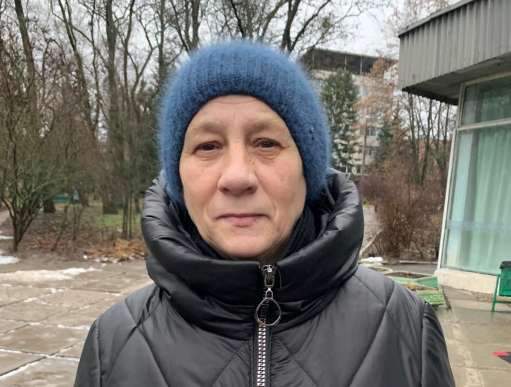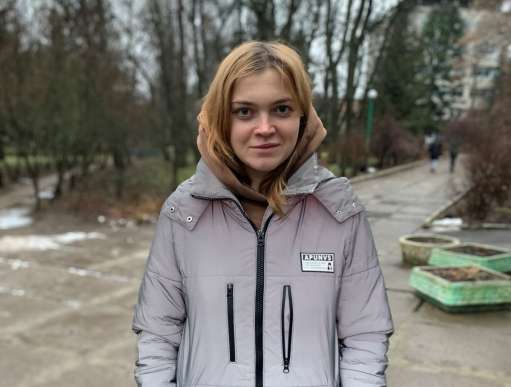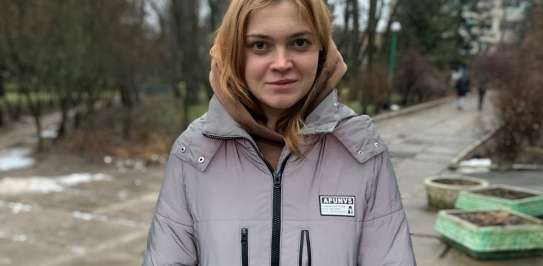Nearly one year into the conflict, there are still 18 million Ukrainians in need of aid and more than 13 million people unable to return to their homes. This includes 5.4 million displaced inside Ukraine and another 8 million Ukrainians living as refugees elsewhere in Europe.
Christian Aid has responded to the crisis by delivering emergency assistance to around 800,000 people affected by the war, both inside Ukraine and in neighbouring countries. Over the winter months, working with partners, we supported thousands of people displaced within Ukraine to better cope with sub-zero temperatures. In this blog, we hear from Yulia and Mykhaila (not their real names) about how the support they received during Ukraine’s cold winter months has helped them.
With funding from the Irish Emergency Alliance, Christian Aid, working with our local partner Alliance for Public Health, have provided cash grants to support 16 community led projects across eastern, central and southern Ukraine helping over 13,000 people.
The cash grants have helped to support local community groups in Ukraine carry out small scale projects that benefit the wider community, including providing families with stoves, warm winter clothes, blankets and flashlights as well as equipping displacement and bomb shelters with heaters, furnaces and electricity generators.
Image credits and information

In Kharkiv in eastern Ukraine, one of these grants allowed a local community group support 120 families living in a shelter by giving them ‘emergency kits’ containing essential items including a flashlight, blankets and pillows.
64-year-old Yulia was one of those who received this support. For the first few months following the beginning of the conflict, Yulia and her family were unable to escape fighting because it was too dangerous to leave their home. They spent almost all of their time sheltering in their dark cellar due to the constant shelling.
Yulia’s village was only a few kilometres away from the frontline and in May, a rocket hit her home, burning it to the ground, leaving the family with nothing.
“It is very dangerous to be in my village,” Yulia said.
“Residential buildings are still often shelled. There is no electricity and gas, shops do not work. Those who remained survive only on humanitarian support,” she added.
In May, together with her daughter and son-in-law as well as her 18-year-old grand-daughter, Yulia was finally evacuated to a shelter in another part of Kharkiv region. Only Yulia and her grand-daughter remain in the shelter today, as her son-in-law is now serving in the Ukrainian army and sadly her daughter has since passed away.
According to the local community group who received the grant, the families living in the shelter have all come from areas formerly controlled by the Russian army. Most families have nowhere to return to and most left without any of their personal belongings.
Despite all she’s been through, Yulia is doing what she can to support the other families that are also living alongside her in the shelter.
“Before the war, I worked as a cook in a kindergarten. I help the staff here to cook meals,” Yulia said.
The local community group, supported with funds raised through the Irish Emergency Alliance Ukraine appeal, was able to provide these families with a mix of blankets and pillows to be used either at the shelter or when having to stay in a bomb shelter during air raid alerts, warm winter jackets for children as well as flashlights to be used when frequent power outages occur
Yulia, who received an emergency kit from Christian Aid’s local partner said: “This is important support for me. The lights are often turned off and the heating is weak, so my granddaughter and I can switch on the flashlight and warm ourselves with a blanket. And the most important thing is that they are ours.”
26-year-old mum of two Mykhaila, who also lives in the same shelter as Yulia, was also supported by the community group.
At the beginning of the war, Mykhaila was living with her husband, two young children and her mother in the same village as Yulia, having only bought their home a year earlier. But as Mykhaila explains, everything changed for her family a month into the war.
Image credits and information

“In March, a rocket hit the house and it was completely destroyed,” Mykhaila said.
“I was very scared and full of dread because my children’s lives were at risk. We were afraid that we would not be able to get out of this hell, but thanks to the volunteers, we were evacuated on the same day,” Mykhaila added.
At present, Mykhaila says that there is no electricity or gas in her village and it continues to be shelled.
Since her home was destroyed, Mykhaila and her family have been living in the shelter in Kharkiv where they were later supported by the local community group who received a cash grant through Christian Aid’s partner Alliance for Public Health, thanks to funds raised through the Irish Emergency Alliance.
Mykhaila received warm winter jackets for her children which they didn’t have before. And like Yulia she also received flashlights, blankets, pillows to help make sure her family had a source of light and are able to keep warm amid regular power outages.
Christian Aid Ireland is a member of the Irish Emergency Alliance, made up of seven leading Irish humanitarian agencies who come together to respond faster and do more to save and help rebuild the lives of people affected by major emergencies worldwide.
